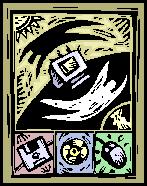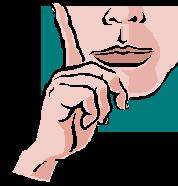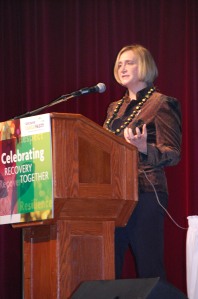On Our Way: Recovery News is a newsletter of Vancouver Acute and Community Mental Health Services and features articles that explore mental health recovery and the work of Vancouver Mental Health Services.
This site includes full issues of the newsletter starting with Issue 9 and also features selected articles from previous issues chosen to be of general interest. If you’d like to subscribe to the full edition, please email the editor, Renea Mohammed at renea.mohammed@vch.ca
To view and see articles from the newsletter via this site, hover your mouse over the “From On Our Way: Recovery News” tab and a list of articles will appear. Click on the one you’d like to see. If this doesn’t work for you, you can also access articles by scrolling down on this page.
Happy reading!
_______________________________________________________________________________________________________________________
Complete Issues
On Our Way Recovery News Issue 9 – This issue explores the theme of wellness. It features entries from the Wellness Art & Photography Contest as well as articles on health and wellness programs, smoking cessation, spirituality, metabolic monitoring, hearing from mental health stakeholders, plus, in the “Perspectives Pages”, “Healing Fires & Burning Marshmallows” by Winter Hammel and a poem called “Spirituality” by Eternal In’Lakesh.
_________________________________________________________________________________________________
Dr. Maggie Bennington-Davis is the Medical and Clinical Chief Organizer for Cascadia Behavioral Health Care in Oregon. She is involved in leading the organization to develop recovery-orientation and trauma-informed services, as well as assisting an effort for optimally efficient service delivery.
Dr. Bennington-Davis presented at the Vancouver Community Mental Health Services Recovery Conference on trauma and trauma informed services. She then graciously offered to answer questions related to this topic via On Our Way: Recovery News.
If you have something you would like answered, we’d love to hear from you. Please leave your questions in comments and we will pass them on.
Here are selected past questions and answers from Dr. Bennington-Davis:
Question:
How does recovery across cultures look? What does it look like in culture that values lifelong interdependence with family?
Answer:
Dr. Ragins talks about 4 components of Recovery: Hope, Empowerment, Self-responsibility, and having a Meaningful Role in Life. I imagine that each of these areas may be manifested in different ways in different cultures, but at their essence, I suspect each is pertinent no matter what one’s cultural influences are.
In western culture, empowerment and self-responsibility (autonomy) have been equated with independence, but that is just one interpretation of empowerment and self-responsibility. Those areas could easily be interpreted in a culturally-consistent way, including… in a family-connectedness context. In cultures that value family interdependence, empowerment could be interpreted as empowerment of the entire family unit (and in fact, this would be the ultimate healthy way to be) wherein the family itself organizes around its strengths and coping, instead of waiting for “cure” or ostracizing the family member for not being able to function in a usual way.
So, I suggest that each person – therapist and consumer – take the four concepts of Recovery (hope, empowerment, self-responsibility, meaningful role) and define what those look like within their culture and value system. And that is what Recovery looks like for them.
Question:
People have said to me that I wasn’t very ill with my mental illness because I am doing so well now. Yet, I suffered for seven years with severe mental illness (psychosis, bipolar). What are your thoughts on this?
Answer:
The pleasure in the question comes from how well it supports the FACT that people with severe mental illness can and do recover. During symptomatic periods, psychosis, mania, depression, anxiety, obsessions and compulsions – I suspect there are not worse things humans must bear. Additionally, perhaps because of the nature of the symptoms – which are psychic, physical, spiritual, and social – people’s lives tend to unravel to some extent in many realms. So, perhaps unlike symptoms of purely bodily nature, psychiatric symptoms are often accompanied with families falling apart, loss of jobs and school placement, loss of homes and housing, loss of friends and partners. The questioner’s report of suffering greatly with symptoms of psychosis and bipolar disorder is not in any way, I am sure, an exaggeration!
Yet, thankfully, even the most severe of psychiatric conditions tend to wax and wane, tend to respond to treatment, tend to improve with social, spiritual, and physical healing. And, in good circumstances, where the person is able to recapture (or not lose) his/her sense of SELF, then that person can (and does) recover – even when some of the symptoms persist.
Although I love the story behind the question, it also reminds me of how much education we’ve yet to do in the general public, which remains ignorant of the pain of severe mental illness and even more ignorant of the promise of recovery.
Be well!
Dr. Maggie
_________________________________________________________________________________________________________________________________________________
 The Emergence of Survivor Groups in B.C.: A Historical Perspective
The Emergence of Survivor Groups in B.C.: A Historical Perspective
Authors: Rosalyn Choi, MSN, BSN, RN, Vancouver Coastal Health, and Dr.Geertje Boschma, PhD, RN, UBC School of Nursing.
Rosalyn Choi works as a staff nurse and as a community health nurse. She has recently written a major essay on the historical trends of mental health care within British Columbia.
Dr. Geertje Boschma, PhD, RN, is an Associate Professor at the School of Nursing of the University of British Columbia. She teaches in the undergraduate and graduate programs. Her research focuses on the history of nursing and mental health care.
We examined the history of survivor groups in BC as part of a larger project on the history of deinstitutionalization, which in BC began in the late 1950s. In BC, the most important provincial institution. Patient numbers peaked at 4,630 in the 1950s, whereafter the hospital continued to downsize (1). An important response to this change was increased patient and family activism, often born out of necessity, if not desperation, because few resources were available in the community when a large number of ex-patients had to find accommodation and support outside of the hospital. We believe it is important for all people involved with mental health care to understand the important shift brought about by active ex-patient, client, survivor, and consumer involvement – terms we will use interchangeably in the remainder of this article.
When consumers began to organize themselves, the notion of “being a patient” gave way to new identities that signified how people with mental illness took on an active and often critical role in the organization of support and resources. A movement of consumers, survivors, and ex-patients (c/s/x) became a critical voice and established a range of new resources (2). Despite the new opportunities brought about by community care, availability of resources was often insufficient to accommodate all people in need of support. Increased homelessness, increased family stress, stigma, and continued discrimination became more apparent. In 1971, one critical response came from a group of ex-patients in Vancouver, who formed the Mental Patients Association (MPA) (3). This organization was led by Lanny Beckman, a client at the Burnaby Psychiatric Day Program, who felt that there were noticeable gaps in service, particularly a lack of emergency psychiatric coverage on weekends and holidays. While in a day program, Lanny noticed three clients had committed suicide, all on weekends. In reaction, Lanny understood the need for patients to organize themselves. He began exchanging phone numbers with other consumers. Among themselves, they generated a phone list so they could find “more real support from their information network” (3, p.1). From then on they began to establish support services and housing, forming a cooperative member-led organization in which consumers had a central role, and, supported by grants and governmental funding, also found employment.
The critique that arose over the mental health care system must be understood in the context of psychiatry also being a history of power. Foucault described the history of psychiatry as a ‘genealogy of power’ (4, p. 41). The power of psychiatry is, for example, reflected in its diagnostic power; medical diagnoses are determined by medical professionals, whose power in turn, is backed by a governmental and legal regulation. Individuals experiencing medical treatment may not always agree with the appropriateness of the services or with its beneficial intent. Moreover, amongst service providers, insights vary as to what is deemed appropriate treatment. The anti-psychiatry movement arose over such differences, with opposing views over many aspects of mental health care, including the notion of mental illness itself. Notions of “consumer” and “survivor” highlight a focus on rights of mental health patients as citizens (4).
Consumers established their own power. MPA leaders Lanny Beckman and Barry Coull, for example, were influenced by the Radical Therapy Movement in North America (3), stemming from a “viewpoint which approaches emotional problems by determining sources of oppression, exploitation and repression in our society” (3, p. 4). MPA members formed self and mutual help groups, sharing their personal experiences. The MPA recognized the need for mental health consumers to obtain a voice. In addition, many consumers also needed to learn basic skills of day-to-day living, which were not usually learned in mental hospitals. The organization identified these skills as ‘participatory democracy’ (3). One of the main goals was to “assist and promote welfare of mental patients and former mental patients” (Vancouver Mental Patients’ Association Society, 1983, p. 1), and create housing, vocational, and recreational resources. The MPA still exists today, but has changed the meaning of its acronym. It now stands for Motivation, Power and Achievement (MPA, 2009).
Consumer organization continued to grow as a participatory and critical response to a changing mental health context. Soon the Lower Mainland saw a variety of consumer and social activist driven organizations, which now form the backbone of the community mental health service system. Various organizations formed drop-in centers, clubhouses and supportive housing, including Coast Mental Health Foundation, Kettle Friendship Society and Mental Health Housing (5). Other important organizations in BC from the 1950s onwards were the BC Division of the Canadian Mental Health Association, which became an important advocate for changes for legislation and mental health policy, and the BC Schizophrenia Society, formed in the 1980s by families and friends of people living with schizophrenia. Finally, we mention the Vancouver/Richmond Mental Health Network Society founded in 1993 by consumer Garry Long (6), later renamed West Coast Network Society. This client-run group provides advocacy, counseling and crisis management for individuals with mental illness. Increased activism resulted in consumer representation on mental health committees, boards and councils at various levels of the government over the last few decades. The history of the consumer movement highlights the importance of critique, collaboration, participation, and continuous renegotiation of the terms on which mental health care is build.
References
1. BC Mental Health and Addiction Services, History, 2008, retrieved from http://www.bcmhas.ca/AboutUs/History.htm
2. Shimrat, Irit. (1997). Call me crazy: Stories from the mad movement. Vancouver: Press Gang Publishers.
3. Vancouver Mental Patients’ Association Society (1983). Head on: Into the eighties. Vancouver: Carolina Publications.
4. Everett, B. (2000). A fragile revolution: Consumers and psychiatric survivors confront the power of the mental health system. Ontario: Wilfrid Laurier University Press.
5. Killam, J. (1999). “Advocacy” and the mental health consumer/survivor: In pursuit of quality of life for all British Columbians with a mental illness. Vancouver, BC: ARA Mental Health Action Research & Advocacy Association of Greater Vancouver.
6. ARA Mental Health Action Research and Advocacy Association of Greater Vancouver, 2009, retrieved from http://www.aramentalhealth.org
________________________________________________________________________
 From the “Words of Wisdom” sections of On Our Way Recovery News:
From the “Words of Wisdom” sections of On Our Way Recovery News:
“Recovery is living one day at a time. It is building new dreams, making new understanding friends and learning to live within my abilities. Recovery is spending the time to heal and become whole once again.” – Anita
“Recovery to me is about living the life I want despite living with a mental illness. It is about recognizing that mental illness is only a small part of who I am. I am a valuable, contributing member of society doing all I can do and being all I can be.” – Debbie
“For those of us who have struggled for years…recovery is not about going back to who we were. It is a process of becoming new. It is a process of discovering out limits but also a process of discovering how these limits open upon new possibilities. Transformation rather tan restoration becomes our path.” – Patricia Deegan
“Recovery involves addressing one’s changed status; one’s changed relationship to state power as embodied in mental health legislation, one’s own perception of one’s status and power, and above all one’s identify.” – Ron Carten
“The main thing to remember is that you should never give up and the help is out there. It took me 8 months to find the “right” help for me, and I did it by networking. I was isolating myself and staying home, but not getting any better. So no matter how you feel, get out and do stuff.” – Wendy
“Recovery means connecting to nature. When I feel the power of nature I am in touch with my inner self. Recovery also means being in balance and nature helps with that.” – Susan
“For me recovering from mental illness means getting stronger in regards to the way I think and feel about my accomplishments. I enjoy being a [peer support worker] PSW and assist people to find work through the “Therapeutic Volunteer Program”. This gives everyone hope and confidence for a brighter future. I strongly believe that each person deserves a chance to grow in their own way.” – Diane
“Recovery is a deeply personal, unique process changing one’s attitude, values, feelings, goals, skills and/or roles.” – William Anthony
“Acceptance of having mental illness is the first step towards healing. Once the denial is gone, then the person can go about making the necessary steps required to stabilize the mental illness. Finding the correct medication and taking them regularly is vital to recovery. A healthy diet, drinking lots of water, proper sleep, vitamins and supplements and spirituality are essential to aid in a successful recovery.” – Paul
“Patience and perseverance are the first words that come to my mind regarding my own experience of mental health recovery and what I have witnessed with others. We need to have patience first of all with ourselves, especially because the path to recovery never takes a straight or direct route and can often be very long and slow. We also need to cultivate an attitude of patience towards others, our families, friends, loved ones those involved in our recovery, since not everyone is going to understand what we are going through. Finally, I think that the Phoenix is an excellent metaphor to hold onto: rising in a new and beautiful form from the ashes of our humiliation.” – Aaron
“Recovery is a journey of self-reflection and discovery.” – Vancouver Community Mental Health Services Core Competency Series Workshop Participant
“A person can live a hopeful and fulfilling life separate from their condition and in the presence of symptoms” – Vancouver Community Mental Health Services Core Competency Series Workshop Participant
“When I started to believe I could recover, I started to get better.” – Anonymous
“When I get motivated or get any housework done, I would call someone: a friend or a professional. I would then do some housework, while talking to them. By the time I got off the phone, I had something started or done, and felt better.” – Eternal
“What is recovery? To live a happy, satisfying life doing what I want and being all I can be.” – Anonymous
Do you have a recovery insight you’d like to share? Leave it in the comments section of this blog or email it to renea.mohammed@vch.ca for future inclusion in “On Our Way: Recovery News.” If you would like your full name to appear by your insight just let me know.
___________________________________________________________________
The compilation of the Oxford English Dictionary began in 1857 and was a highly ambitious project. As definitions were collected, the overseeing committee discovered that more than ten thousand definitions had been submitted by Dr. William Chester Minor. When the committee went to honor him for his exceptional contributions, they discovered that he lived with mental illness, probably schizophrenia, and was submitting his definitions from an insane asylum. Check out The Professor and the Madman by Simon Winchester for more of the story.
________________________________________________________________________
There’s a great website on brain fitness featuring articles, resource iformation and brain games. Check out: http://www.sharpbrains.com
_________________________________________________________________________
 From the “Perspectives Pages” of On Our Way: Recovery News
From the “Perspectives Pages” of On Our Way: Recovery News
Debugging the Brain: A Path to Recovery
Interview with “Victor Race”
By Renea Mohammed
I recently had the opportunity to interview Victor about his unique approach to recovery. Victor has a background in computer programing, design and problem solving. When he was struck with mental illness and diagnosed with schizoaffective disorder, he decided to take an active approach to his own recovery. He decided to apply the problem solving skills he used in the computer industry to his own mental health. He said with computers, you are working with information all the time. The human brain does the same thing. When he became ill, it meant his brain was misprocessing information. Recovery, for Victor, was like debugging a computer.
In programming, he said, if there was a software malfunction, then information or input needs to be controlled and analyzed. Victor started to look at the things in his life as information: that included food, people and the environments he found himself in. It was all input for his brain. Because his brain was no longer working correctly, he went through a process of deliberately restricting the input it received in order to better understand the illness he was dealing with.
Victor was attempting to eliminate random variables so that he could see things more clearly. He used the analogy of a speeding car. When the car is speeding, it’s hard to see the car in detail. But when you slow it down, you can pick out details like the license plate, the person driving, dents, hub cap design, et cetera. With his illness he had to slow everything down and control the information. He started to walk the same path every day. He ate the same thing every day. He eliminated meat, alcohol, sugars and chemical stimulants from his diet in an effort to eat in a way that was pure. He became vegan, seeing veganism as being about compassion to animals, passivity, having the least impact on things, and about having self-control. He said a big part of illness was not being able to control the self. Veganism was the opposite. He also had to understand his triggers and eliminate them via the restrictions he adopted in his life.
It wasn’t always easy. When Victor was hospitalized, he found himself in an environment he could not control. The experience made him more ill. He described the hospital as an irregular environment full of irregular people. He noted people in hospital are affected by each other and react to each other. There is no private space. You don’t even get your own room. And, in this unnatural environment, people are observed for symptoms.
He said the observers aren’t going to get reliable results in the hospital context because it is so unnatural. He described being told that if he didn’t sleep, medication would be forced on him. Yet how was he supposed to sleep with the guy beside him snoring loudly? He described one doctor saying he was paranoid, delusional and suicidal because he wouldn’t eat the food offered to him. Yet the reason he wasn’t eating was that the food being offered didn’t fit within his vegan diet. Victor said everything was manageable up to the point of his hospitalization. But the hospital experience exacerbated his situation to the point where he lost the control he had so carefully cultivated, making recovery more difficult.
When he was released from hospital, Victor got control back and continued to approach his recovery by controlling all the elements in his life. As a result he has come to understand the mechanism behind the delusions of reference he once experienced. He understands them now as his brain malfunctioning in its analysis of the relationships of information. He is relearning at a cognitive level and dealing with misprocessing. He is also feeling a lot better as a person. His anxiety is down. He is more grounded. He is making progress in his recovery.
But Victor noted that recovery hasn’t been about going back to the state he was in before he became ill. He said you can’t really do that because all of the experiences people go through leave us in a state of constant change. Recovery wasn’t about going back. It was about being able to deal with the current situation and being able to move forward. And recovery is something we all do. Take our physical bodies for example, our cells are constantly dyeing and being replaced – a form of recovery. Recovery is something everyone does whether they are conscious of it or not.
He notes recovery from illness shouldn’t be foreign to us, but it can be overwhelming. A big part of it is noticing that your reality is conflicting with the realities of others. You have to look at the contradictions going on, figure out why others are able to function better, understand that there are issues of your illness preventing you from functioning at a standard level and then figure out how to deal with those issues.
When asked about tips for people supporting others in their recovery process, Victor suggested putting in as many foundations for recovery as possible. These include resources, time, money, diet and services available. The more foundations that are in place, the better the outcome. Victor said it took him over a year to really understand what reality was. With a better foundation, his recovery might have been faster.
_______________________________________________________________________________________________________________________
 From the “Perspectives Pages” of On Our Way: Recovery News
From the “Perspectives Pages” of On Our Way: Recovery News
Recovery:
A Staff Perspective
By Stephen Epp, Occupational Therapist
Someone I know could be labeled a client, a co-worker, a teacher, and, most importantly, an inspiration. I have heard her story, watched her facilitate groups, participated with her on a committee, and visited her in an acute psychiatric ward. She has a mental illness, receives assertive community treatment, and, most importantly, she has a life. She is not an isolated example. I regularly witness people with incredible stories of trauma, victimization, and severe mental health symptoms demonstrate resilience, recover, live beyond their illness and develop a purposeful life.
As we know, mental illnesses can be devastating to the individuals affected and also to their families. These illnesses create serious barriers to quality of life. For people with mental illness, the client and family recover by reclaiming, regaining, and recovering the roles in their lives that lead to social inclusion, meaningful engagement in life, and participation in their communities. That is the goal.
At Strathcona Mental Health Team, I have found that the severity of a mental illness does not seem to predict a person’s ability to make friends, build connections, and create a life of which they are proud. The largest barriers to increased quality of life and reclaiming valued roles in society seem external to the illness. I see societal attitudes, stigma, a lack of public examples of successful recovery, and a lack of a belief in and an expectation of recovery being the greatest barriers to recovery for people with mental health issues. Health care clinical effectiveness is typically defined in “terms of correctness of diagnosis and appropriateness and efficacy of treatment and care provided.”[1] However, for real recovery, the data no longer supports the dated model of an expert therapist guiding a naïve client towards the light of mainstream society. To become recovery oriented, we need to help “clients” become responsible citizens. We help them by modifying expectations within the environment in which they live.
The term “recovery,” means many things to many people. There are comparisons to the human rights/civil rights movements of African-Americans in the 1960s. There is a comparable gap in basic human rights, a lack of a power and voice, under-employment, social problems, lack of peer stewards, learned helplessness, the same token representation, and similar misrepresentation in the media. The current medical model also tends to place responsibility for change predominantly on the individual with the mental illness. In his book, The Careless Society: Community and Its Counterfeits, John McKnight writes, “revolutions begin when people who are defined as problems achieve the power to redefine the problem.”[2]
How do we empower individuals, establish a voice, enable responsibility, and achieve steps toward recovery given the environmental barriers?
First, we need to acknowledge the expertise that the client brings. As Occupational Therapists, we espouse client-centered practice. We are required to consider and provide interventions related to the interplay among the individual, their environment, and their occupations. This affords the client a level of choice to select the direction of change based on their motivation, their perspective on the problems, and their definition of success. Our goal as therapists is to enable the individual and the family to build confidence, explore options and achieve successes, under the overarching belief that there is an expectation of recovery.
Second, we need to believe that all clients can exercise responsibility to establish recovery. The only way to learn responsibility is through responsibility. We can not wait until the client is “cured” or “fixed enough” before we place the expectations of citizenship and the responsibility to create a life. We start as we mean to finish.
To achieve this goal, therapists and clients both need to close the gap on how success is defined. A client may come from a place of complete dysfunction and in the process of treatment, progress towards a stable environment with shelter, better mental health and increased social participation. This progress may be perceived as a wonderful success story — and it is. However, in a full recovery, a “successful” story will include social inclusion in the mainstream community, friendships within and outside the mental health system, and employment.
In contrast with our Western society, people with schizophrenia living in “developing” countries appear to have higher quality of life, lower severity of symptoms, greater social inclusion and higher community integration.[3] The difference occurs because the goals and expectations of the client are social inclusion, community integration, and increased quality of life from the beginning of treatment. Recovery is expected through meaningful community engagement and medications, counseling, and support for immediate return to productive roles within their communities.
This model stands in contrast with our society and system. At its worst, our system encourages clients to settle for living on a disability pension and accepting a life of poverty. Doing “well” means little more than “avoiding hospital.” The client is expected to be “psychosis/symptom free” before exploring a reclaimed role in society.
To change this pattern, we need to strike a balance, trying to find the “optimal challenge” to encourage a life worth living. Even though the Strathcona Mental Health Team in Vancouver is usually committed to the values of recovery and tries to instill hope, our environment, both within the health care system and in our communities, continues to significantly impede success. However, we are making progress.
In the Strathcona Psychosocial Rehab Program, we facilitate not only traditional life skills, leisure, and a wellness program. We also introduce clients to other clients who have regained power within our society. I define this power as having the freedom and opportunity to exercise choice based on their strengths, desires, and hopes for their future. At every opportunity, we highlight individual stories of success and encourage these stories to be spread. We try to influence social opinion beyond the person with the mental illness. If possible, we encourage clients to develop leadership skills and to perceive themselves as dynamic and useful citizens. We create a voice for the people targeted for mental health care service. We invest in the relationship by creating a partnership where our clients perceive us as human beings, problem solving together to overcome barriers. Some staff members have been hired specifically for positions requiring a personal, “lived” experience of mental illness. As time progresses, I hope to see more professional staff (Nurses, Occupational Therapists, Managers, etc.) who are chosen because of the wisdom that comes with their personal “lived” experience with or supporting a family member with mental health issues. Although the same message may have been stated many times, it often takes trust on a “peer” level for information to have a positive impact.
I have found that, in so many cases, the message is far less important than the messenger who gives it. The inherent power differential between a therapist and a client needs to be understood. The power of peer support, family involvement, and the concept of partnering to achieve a goal need to be acknowledged.
How do we lead a recovery-oriented system? We create leaders within our client and family population. We provide a space where we, as professionals, can step back and listen. Based on continuous feedback, we work with communities to create windows of opportunity for people with mental illness and their families. We look for the “just right challenge” to demonstrate that we expect recovery and we continue to support citizens in achieving valued roles in the community.
[1] Salvatori, P. et. al. Can J Occup Ther. 2008 Feb;75(1):51-60
[2] McKnight, J. (1995) The Careless Society: Community and Its Counterfeits. NY: Basic Press, 1995.
[3] Anders, S. Psychiatr Rehabil J. Improving community-based care for the treatment of schizophrenia: Lessons from nativeAfrica. 2003 Vol 27 (1).



